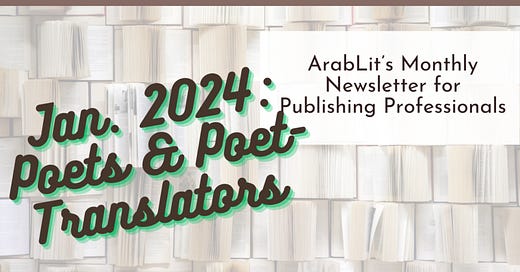January: Arabic Poetry & Poet-Translators
Ring in the new year with poetry. We feature poets, poet-translators, a new collection, a new magazine, & more.
Yes, we realize that few agents, scouts, & publishers are actively seeking new poets to publish in translation. Yet collections by Iman Mersal (tr. Robyn Creswell), Maya Abu al-Hayyat (tr. Fady Joudah), Najwan Darwish (tr. Kareem James Abu-Zeid), and Mona Kareem (tr. Sara Elkamel) have had significant impact in recent years.
Also, poetry has played a vital role in the discussion of genocide and censorship of Palestinian voices in Europe & North America; poetry has spoken clearly and powerfully when many other genres have dulled our senses by repeating the same words & phrases again and again.
Interventions by Palestinian poets Fady Joudah, Basman Eldirawi, Ahlam Bsharat, Refaat Alareer, Samer Abu Hawwash, and others have been shared widely.
Publishers interested in an intervention into the current landscape should consider supporting the translation of work by Salim Al-Naffar and Hiba Abu Nada, both killed under bombardment in Gaza, or Ahlam Bsharat’s straightforward and powerful poems, the delicate poems of Asmaa Azaizeh, or the moving work of Palestinian Gazan poet Basman Eldirawi.
🔦9 Notable Poets without a Full-length Collection in English Translation
First, six living poets.
Asmaa Azaizeh (Palestinian). As ArabLit contributor Amira Abd El Khalek wrote of the Palestinian poet’s work, her “poems are potent yet delicate renderings of seemingly simple everyday things.” Read six of her poems translated by Yasmine Seale.
Soukina Habiballah (Moroccan). Habiballah introduces compelling and unexpected personifications into her narrative and filmic poems. You can read six poems in English, translated by Robin Moger.
Fatima Qandil (Egyptian). In a chapter in Arab Women Writers: A Critical Reference Guide, 1873-1999, Hoda Elsadda writes that Qandil “weaves the strands of her lexicon with the utmost care and then scatters them on paper, creating meanings that quietly pierce deep into the walls of consciousness.” In translation, read “Keys,” tr. Josh Beirich.
Emad Abu Saleh (Egyptian). In 2021, reclusive Egyptian poet Emad Abu Saleh won the Sargon Boulus prize. While he has published a number of collections, and is beloved of both poetry readers and critics, relatively little of his work has made its way into translation. You can read three of his poems translated by Salma Harland and four by Huda Fakhreddine.
Rana al-Tonsi (Egyptian). Al-Tonsi writes achingly and sparely on motherhood and love. In English, you can read poems from The Book of Games, tr. Robin Moger.
Abdallah Zkrika (Moroccan). Born in 1953 in Casablanca, Zrika’s first works were published in various Arabic newspapers and magazines in Morocco when he was just 20. He was imprisoned for two years starting in 1978, the “Years of Lead,” because some of his poems were deemed dangerous. The Moroccan poet’s haunting poems are interested in the boundaries between prose and poetry, life and death. Read an interview with the poet; two short prose poems translated by Habib Louai; and “The Funeral of the Snow Grenade” translated by Tim DeMay.
And three poets who are deceased.
Saleem Al-Naffar (Palestinian) was born in Gaza to a family displaced from Jaffa, then grew up in exile in Jordan and Syria. He studied literature at Tishreen University and returned to Gaza in 1994. He wrote a dozen books of poetry and prose and was one of the most widely respected poets in Gaza. His work has appeared in A Bird Is Not a Stone in English translation. He died under aerial bombardment in December 2023.
Saniya Saleh (Syrian). In translation, you can read “Cure Your Slavery with Patience,” tr. Marilyn Hacker, “The Condemned Lakes,” tr. Hacker, and “The Only Window, in Disrepair,” tr. Robin Moger, as well as Mersal’s essay about looking for Saleh.
Da’ad al-Haddad (Syrian). About this poet, Golan Haji has said, “Regardless of the superlative “most notable” woman poet in the Arab world, I could mention Fatima Qandil or Sanyyah Saleh, but I’d love to talk about Da’ad Haddad who died in 1991. … Her “naïvety” is astounding sometimes, like raw brut art paintings.” In translation, you can read “Black is this night,” tr. Golan Haji
You can find more poetry in translation at our website, at arablit.org/poetry/. If you enjoy poetry in translation, consider signing up for our other Substack:
#ReadforRefaat
Educator, editor, and poet Refaat Alareer died under Israeli bombardment in December 2023. The Publishers for Palestine collective — of which ArabLit is a member — is calling for a Global Day of Action on the fortieth day after Refaat’s death, in which falls on January 15, 2024. Find out how you can participate here at publishersforpalestine.org/
📚On Poet-Translators
Speaking as editors, we know how difficult it is to find the right translator for a poetic work. Although a translator of poetry need not necessarily be a poet themself, poet-translators often read a lot of poetry and understand the poetic conventions of both languages. Seven we strongly recommend:
Nashwa Nasreldin (yes, our own poetry editor)
For information about how to be in touch with the above poet-translators, please reach out to info@arablit.org.
🗓️Upcoming events
The 2024 Cairo International Book Fair is set for January 24 - February 6. Norway is the guest of honor.
The 2024 Emirates Airlines Festival of Literature will run at roughly the same time: January 31 to February 6, 2024.
The 2024 Festival du livre africain de Marrakech is set for February 8-11. Find more at their Facebook page.
You can find more events on our calendar. Email us at info@arablit.org to add yours.
💰Grants, subsidies, & support
Don’t miss LEILA’s list of grants, subsidies, and support on their new website.
The Sheikh Zayed Book Award offers a translation subsidy for select titles.
If you know if grants or subsidies targeting Arabic literature, please let us know at info@arablit.org.




Great list! Da'ad Haddad must - and will - have a collection of her works in English translation.